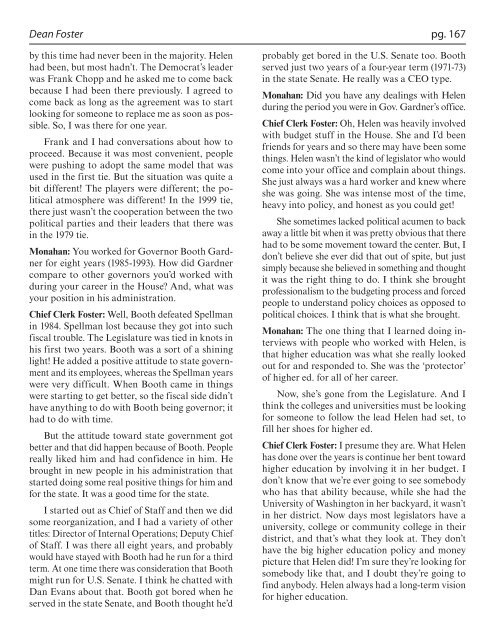Helen Sommers: An Oral History
Helen Sommers: An Oral History
Helen Sommers: An Oral History
Create successful ePaper yourself
Turn your PDF publications into a flip-book with our unique Google optimized e-Paper software.
Dean Foster<br />
by this time had never been in the majority. <strong>Helen</strong><br />
had been, but most hadn’t. The Democrat’s leader<br />
was Frank Chopp and he asked me to come back<br />
because I had been there previously. I agreed to<br />
come back as long as the agreement was to start<br />
looking for someone to replace me as soon as possible.<br />
So, I was there for one year.<br />
Frank and I had conversations about how to<br />
proceed. Because it was most convenient, people<br />
were pushing to adopt the same model that was<br />
used in the first tie. But the situation was quite a<br />
bit different! The players were different; the political<br />
atmosphere was different! In the 1999 tie,<br />
there just wasn’t the cooperation between the two<br />
political parties and their leaders that there was<br />
in the 1979 tie.<br />
Monahan: You worked for Governor Booth Gardner<br />
for eight years (1985-1993). How did Gardner<br />
compare to other governors you’d worked with<br />
during your career in the House? <strong>An</strong>d, what was<br />
your position in his administration.<br />
Chief Clerk Foster: Well, Booth defeated Spellman<br />
in 1984. Spellman lost because they got into such<br />
fiscal trouble. The Legislature was tied in knots in<br />
his first two years. Booth was a sort of a shining<br />
light! He added a positive attitude to state government<br />
and its employees, whereas the Spellman years<br />
were very difficult. When Booth came in things<br />
were starting to get better, so the fiscal side didn’t<br />
have anything to do with Booth being governor; it<br />
had to do with time.<br />
But the attitude toward state government got<br />
better and that did happen because of Booth. People<br />
really liked him and had confidence in him. He<br />
brought in new people in his administration that<br />
started doing some real positive things for him and<br />
for the state. It was a good time for the state.<br />
I started out as Chief of Staff and then we did<br />
some reorganization, and I had a variety of other<br />
titles: Director of Internal Operations; Deputy Chief<br />
of Staff. I was there all eight years, and probably<br />
would have stayed with Booth had he run for a third<br />
term. At one time there was consideration that Booth<br />
might run for U.S. Senate. I think he chatted with<br />
Dan Evans about that. Booth got bored when he<br />
served in the state Senate, and Booth thought he’d<br />
pg. 167<br />
probably get bored in the U.S. Senate too. Booth<br />
served just two years of a four-year term (1971-73)<br />
in the state Senate. He really was a CEO type.<br />
Monahan: Did you have any dealings with <strong>Helen</strong><br />
during the period you were in Gov. Gardner’s office.<br />
Chief Clerk Foster: Oh, <strong>Helen</strong> was heavily involved<br />
with budget stuff in the House. She and I’d been<br />
friends for years and so there may have been some<br />
things. <strong>Helen</strong> wasn’t the kind of legislator who would<br />
come into your office and complain about things.<br />
She just always was a hard worker and knew where<br />
she was going. She was intense most of the time,<br />
heavy into policy, and honest as you could get!<br />
She sometimes lacked political acumen to back<br />
away a little bit when it was pretty obvious that there<br />
had to be some movement toward the center. But, I<br />
don’t believe she ever did that out of spite, but just<br />
simply because she believed in something and thought<br />
it was the right thing to do. I think she brought<br />
professionalism to the budgeting process and forced<br />
people to understand policy choices as opposed to<br />
political choices. I think that is what she brought.<br />
Monahan: The one thing that I learned doing interviews<br />
with people who worked with <strong>Helen</strong>, is<br />
that higher education was what she really looked<br />
out for and responded to. She was the ‘protector’<br />
of higher ed. for all of her career.<br />
Now, she’s gone from the Legislature. <strong>An</strong>d I<br />
think the colleges and universities must be looking<br />
for someone to follow the lead <strong>Helen</strong> had set, to<br />
fill her shoes for higher ed.<br />
Chief Clerk Foster: I presume they are. What <strong>Helen</strong><br />
has done over the years is continue her bent toward<br />
higher education by involving it in her budget. I<br />
don’t know that we’re ever going to see somebody<br />
who has that ability because, while she had the<br />
University of Washington in her backyard, it wasn’t<br />
in her district. Now days most legislators have a<br />
university, college or community college in their<br />
district, and that’s what they look at. They don’t<br />
have the big higher education policy and money<br />
picture that <strong>Helen</strong> did! I’m sure they’re looking for<br />
somebody like that, and I doubt they’re going to<br />
find anybody. <strong>Helen</strong> always had a long-term vision<br />
for higher education.
















